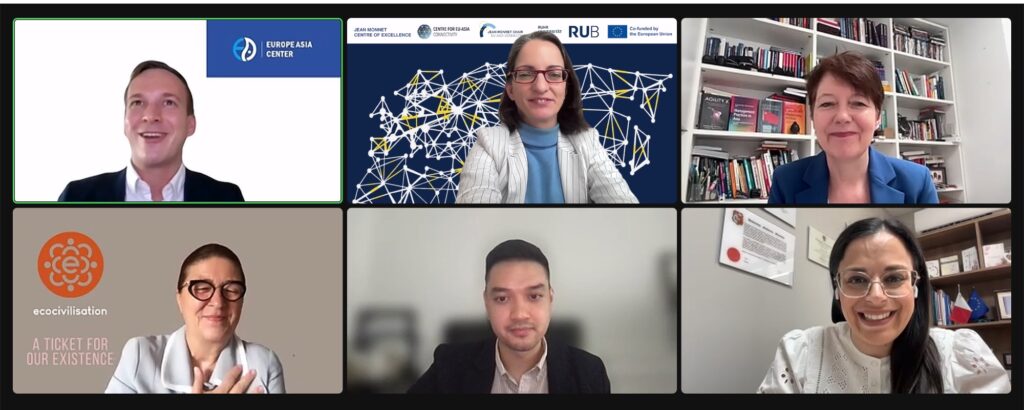Webinar: Charting the Future: High-Level Dialogue on Elevating EU-Asia Digital Connectivity
Brussels, June 21, 2024
The Europe-Asia Center hosted a webinar titled “Charting the Future: High-Level Dialogue on Elevating EU-Asia Digital Connectivity.” This dialogue aimed to foster a deeper understanding and collaboration between Europe and Asia in the realm of digital connectivity.
The event brought together prominent leaders, experts, and policymakers to discuss and strategize on the future of digital governance and connectivity between the two regions.
- H.E. Dr. hc. Violeta Bulc, Vice-chair of the Europe-Asia Center and former EU Commissioner for Transport and Mobility, who will provide insights into the transformative potential of digital connectivity and its impact on EU-Asia relations.
- H.E. Josianne Cutajar, Member of the European Parliament (S&D, Malta) and rapporteur on the AI Act, who will discuss the legislative and regulatory landscape shaping the future of AI and digital connectivity in Europe.
- Mrs. Mireia Paulo, Head of Management of the Centre for EU-Asia Connectivity (CEAC) at the Jean Monnet Centre of Excellence, Lecturer and Research Associate at Ruhr-Universität Bochum (RUB), and Arbitrator/Mediator at the Shanghai International Arbitration Center (SHIAC), will delve into the operational aspects of EU-Asia digital partnerships and the role of arbitration in resolving cross-border digital disputes.
- Mr. Siriwat Chhem, Co-Founder and President of the AI Forum, Advisor to the President of the National Assembly of Cambodia with the rank of Undersecretary of State, and Strategic Advisor to the Asian Vision Institute think tank, will share insights on the strategic significance of AI in enhancing digital connectivity and governance frameworks.
- Prof. Dr. Christine Prange, Director of the Caralan Global Institute, Adjunct Professor at Zhejiang University International Business School, and Research Director of the Europe-Asia Center, will discuss the academic and research dimensions of digital connectivity and the importance of international collaboration in driving innovation
Background and Context
In recent years, the digital landscape has become an integral part of European life, revolutionizing various sectors and redefining societal norms. While digital transformation brings undeniable benefits, it also introduces new challenges and risks, including threats to fundamental rights, democratic processes, and economic stability. Europe has emerged as a global leader in internet governance, evidenced by landmark regulations such as the Digital Markets Act (DMA), the Digital Services Act (DSA), and the world’s first AI Act.
The governance of cyberspace is evolving rapidly, driven by the proliferation of interconnected devices and advancements in artificial intelligence. This transformation has sparked a geostrategic competition for control over digital connectivity, highlighting the need for robust governance frameworks. Amidst these developments, the European Union (EU) seeks to strengthen its strategic autonomy and collaborate with key global partners to shape the future of digital connectivity.
As the upcoming European elections approach, potential shifts in democratic majorities could have significant implications for European digital governance. Understanding these potential ramifications is fundamental for managing the EU’s digital transformation and achieving its regulatory objectives in collaboration with other stakeholders.
The “Charting the Future” dialogue represents a crucial platform for exchanging ideas and forging partnerships to navigate the complexities of digital connectivity between Europe and Asia, ensuring a secure and prosperous digital future for both regions.
